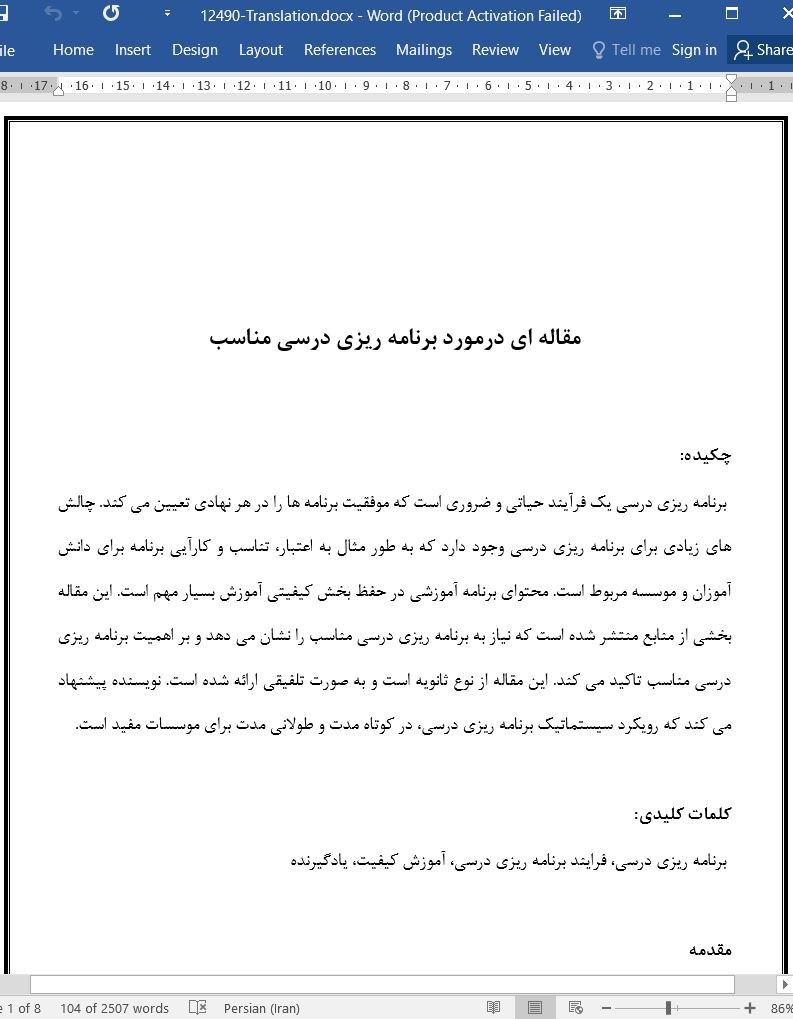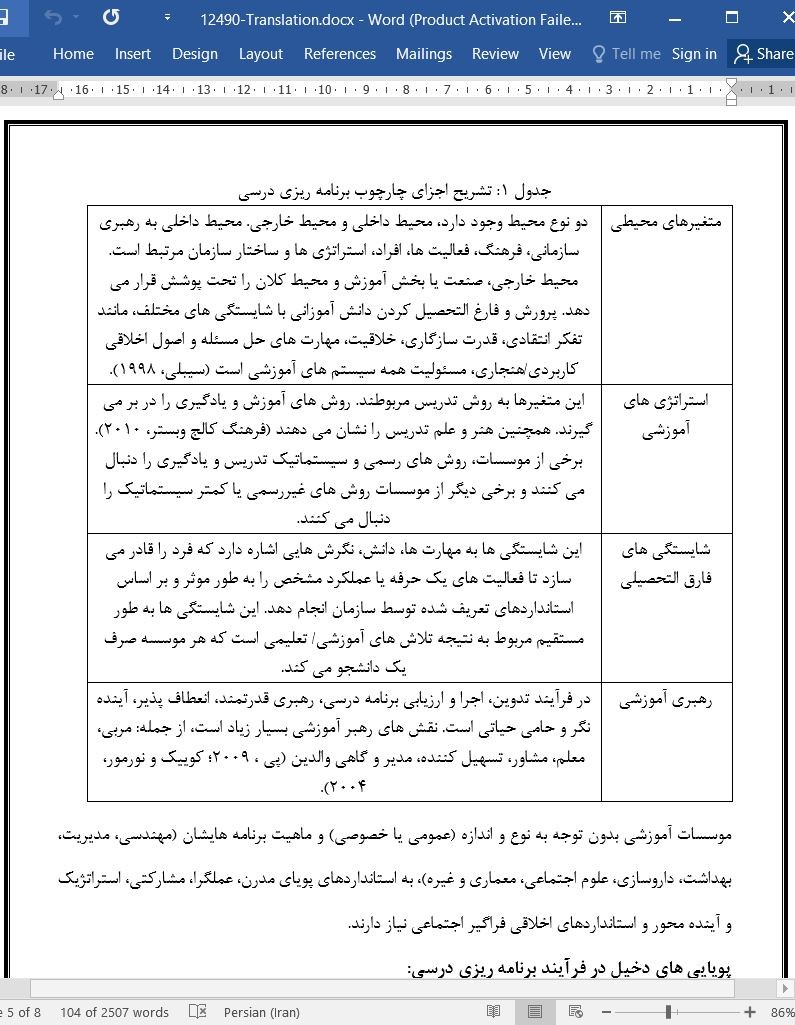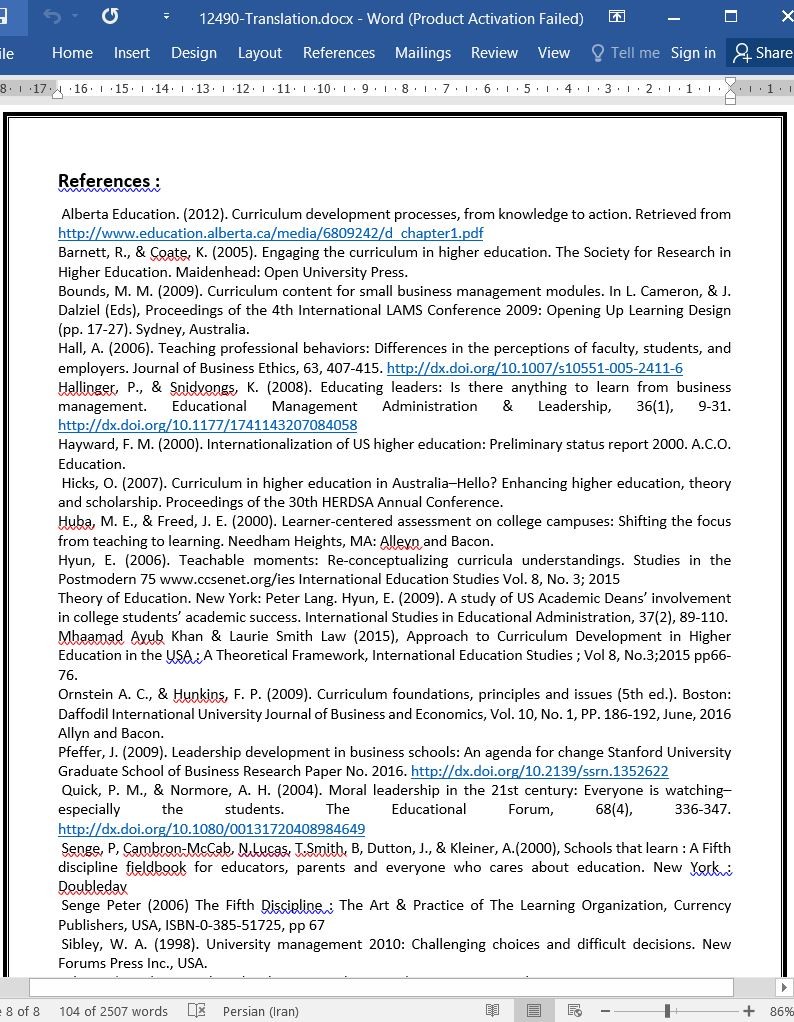
دانلود مقاله مقاله ای درمورد برنامه ریزی درسی مناسب
چکیده
برنامه ریزی درسی یک فرآیند حیاتی و ضروری است که موفقیت برنامه ها را در هر نهادی تعیین می کند. چالش های زیادی برای برنامه ریزی درسی وجود دارد که به طور مثال به اعتبار، تناسب و کارآیی برنامه برای دانش آموزان و موسسه مربوط است. محتوای برنامه آموزشی در حفظ بخش کیفیتی آموزش بسیار مهم است. این مقاله بخشی از منابع منتشر شده است که نیاز به برنامه ریزی درسی مناسب را نشان می دهد و بر اهمیت برنامه ریزی درسی مناسب تاکید می کند. این مقاله از نوع ثانویه است و به صورت تلفیقی ارائه شده است. نویسنده پیشنهاد می کند که رویکرد سیستماتیک برنامه ریزی درسی، در کوتاه مدت و طولانی مدت برای موسسات مفید است.
مقدمه
نقش برنامه تحصیلی در آموزش عالی بی همتاست و از اهمیت بالایی برخوردار است. صرف نظر از اندازه، نوع یا منشا موسسات، برنامه تحصیلی قلب و روح همه موسسات آموزشی در نظر گرفته می شود. برنامه تحصیلی هم در کوتاه مدت و هم در بلندمدت، برای بهبودی و اثربخشی آموزش عالی ضروری است (بارنت و کوآت، ۲۰۰۵). در محیط های دانشگاهی به طور گسترده ای پذیرفته شده است که رویکرد برنامه ریزی درسی مناسب، مستلزم درک کامل عناصر استراتژیک مختلف مانند رهبری سازمانی، گرایشات اجتماعی، عامل صنعت، حاکمیت و ویژگی های آن هاست. چالش اصلی مربوط به برنامه ریزی درسی نیست، بلکه مربوط به رویکرد و روشی است که یک موسسه برای ایجاد هر برنامه آموزشی انتخاب می کند. به هر حال باور بر این است که سیستم آموزشی منبع عظیمی از مباحث و برنامه درسی است که با اعتقادی راسخ به عدم تغییر در مفاهیم بنیادی یک مبحث، این برنامه ها را به دو نسل از یک خانواده پیشنهاد می کند. بسیاری از موسسات تنها با این تصور احساس نمی کنند که به برنامه ریزی درسی نیاز دارند، بلکه این کار را به اضافه کردن یا حذف تشریفاتی موضوعات محدود می کنند تا از طریق هیئت ها/ کمیته های مختلف در سطح موسسات به نمایش بگذارند.
نتیجه گیری
بحث درمورد اهمیت برنامه ریزی درسی در موسسات، یک موضوع تاریخی و معاصر است و بحث در این زمینه ادامه خواهد یافت (بوندز، ۲۰۰۹). ما نباید روند برنامه ریزی درسی را تنها با افزودن چند دوره جدید یا تغییر برخی موضوعات در برنامه درسی موجود، که توسط چند مدیر آکادمیک انجام می شود، جایگزین کنیم. طبق استانداردهای مختلف کیفیت که در سازمان های اعتبارگذاری ملی و بین المللی ایجاد شده، برنامه ریزی تحصیلی یک فرآیند کامل است و باید به شدت جامع، مشارکتی و عامه پسند باشد. رویکرد سیستماتیک برنامه ریزی درسی در کوتاه مدت و طولانی مدت برای موسسات مفید است.
Abstract
Curriculum development is a critical but essential process to determine the success of programs in any institution. There are many challenges while developing curriculum such as related to its relevance, appropriateness and usefulness to the students and institution. Contents of the curriculum do matter a lot in maintaining quality part of education. This article is a piece taken from published sources to represent the need of developing relevant curriculum & highlight the important of developing relevant curriculum. This article is secondary in nature and presented just as a compilation. Author suggested that the systematic approach of curriculum development is beneficial for institutions in short run and long run.
Introduction
The role of curriculum in higher education is unmatched & holds high importance. Regardless of its size, type or origin, it is considered the heart and soul of all educational institutions. Curriculum is crucial for the well-being and effectiveness of higher education (Barnett & Coate, 2005) both in the short and long term. It is widely accepted concept in academia that the approach to develop appropriate curriculum requires thorough understanding of various strategic elements such as institutional leadership, social trends, industry factor, govt and profile of learners. The real challenge lies not in the developing the curriculum but in the approach and method that an institution chose to build on any curriculum. Somehow, education system is conveniently believed to have large storage of subjects and curriculum to offer for two generations of a family with strong belief of having no change in the fundamental concepts of a subject. Just in this impression, many institutions don’t feel necessary to develop curriculum considering it limited to just adding or deleting topics as a formality to showcase through various Boards/Committees at Institutions level.
Conclusion
The discussion on importance of curriculum development in institutions is historical as well as contemporary and the debate will continue (Bounds, 2009). We should not replace the process of curriculum development by just adding few new courses or changing a few topics in the existing curriculum, which is done by few academic administrators. It is a complete process and should be highly inclusive, participative and democratic as demanded by various quality standards set in by national and international accreditation agencies. The systematic approach of curriculum development is beneficial for institutions in short run and long run.
چکیده
مقدمه
تناسب برنامه درسی
الزامات برنامه درسی
فرآیند برنامه ریزی درسی-مفهوم موجود
پویایی های دخیل در فرآیند برنامه ریزی درسی
نتیجه گیری
منابع
Abstract
Introduction
Relevance of Curriculum
Requirement of Curriculum
Curriculum Development Process – Existing Concept
Dynamics involved in the Curriculum Development Process
Conclusion
References
- اصل مقاله انگلیسی با فرمت ورد (word) با قابلیت ویرایش
- ترجمه فارسی مقاله با فرمت ورد (word) با قابلیت ویرایش، بدون آرم سایت ای ترجمه
- ترجمه فارسی مقاله با فرمت pdf، بدون آرم سایت ای ترجمه



